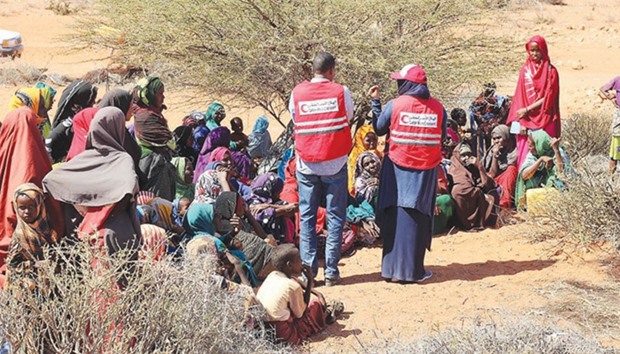Qatar Red Crescent (QRCS) has said its mission in Somalia is set to initiate Ramadan projects worth nearly QR5.5mn in order to help improve the living standards of vulnerable groups and mitigate the impact of the three-year drought.
Under its annual Ramadan Iftar, QRCS will distribute food packages to poor families at a total cost of QR400,680. Lasting for 15 days each, these distributions will benefit 2,500 families or some 12,500 people.
Also, a therapeutic nutrition centre will be established to reduce malnutrition and resulting deaths. Expected to serve more than 15,000 people, the new centre will have a budget of QR5mn.
QRCS and Katara – the Cultural Village Foundation recently completed a fundraising campaign for Somalia. The joint drive could secure QR2.3mn of relief and food aid, to be taken into Somalia through Berbera Port, according to a
statement.
The humanitarian situation across Somalia is critical, with the drought and looming famine threatening the lives of 6.7mn people as well as livestock. According to the United Nations Office for the Co-ordination of Humanitarian Affairs (OCHA) statistics, even more people need urgent humanitarian aid, including 3.2mn “on the verge of a disaster”.
Since November 2016, about 680,000 people have been displaced while around 1.4mn children are at risk of malnutrition. Looking for food, some 7,000 have crossed the borders into Ethiopia and Kenya.
The communities of internally displaced persons, too, witness poor living conditions, endemics, scarce food and low sanitation levels. The World Health Organisation has recorded 32,000 watery diarrhoea, 5,600 measles and 370,000 malnutrition cases.
“Having played a vital role in dealing with the drought of 2011, QRCS is actively engaged in the efforts against the current drought, with ongoing development and health projects across the country,” the statement noted.
Soon, a multi-sector emergency intervention programme will be launched with $2mn from rge Qatar Fund for Development. Another health project will be conducted in co-operation with the United Nations.
Over the past few years, QRCS has operated Afgooye Public Hospital, which is the only health service provider in Lower Shebelle, serving 250,000 people. It also runs three medical centres in Middle Shebelle, Sool and Sanaag, which take care of 280,000 patients.
The third phase of the integrated development and rehabilitation programme was launched in Lower Shebelle, Middle Shebelle and Banaadir. It is planned to provide a bunch of services in water, healthcare and food security, benefiting more than 21,000 people of different groups.
An agreement was signed with OCHA to operate a number of health facilities, despatch mobile clinics to remote towns of Lower Shebelle and Middle Shebelle and refer serious cases to QRCS hospitals and centres. The intervention also includes water and food security projects, covering 52,000 people in total.

The QRCS initiative is aimed at helping improve the living standards of vulnerable groups and mitigating the impact of the three-year drought.
